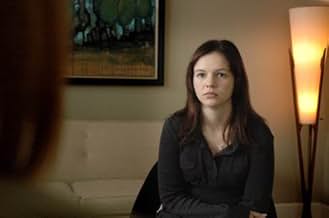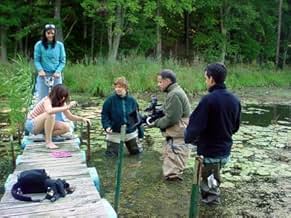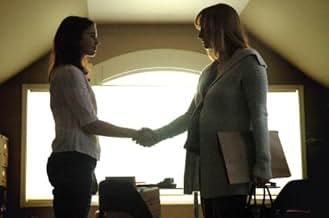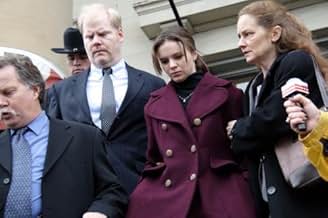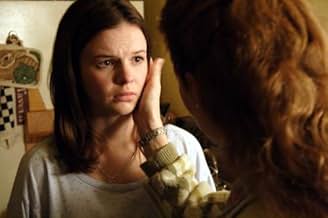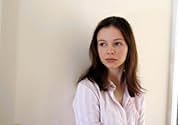CALIFICACIÓN DE IMDb
6.2/10
2 k
TU CALIFICACIÓN
La psicóloga forense Lydie Crane, embarazada, es contratada para averiguar la verdad que se esconde tras el caso de Stephanie Daley, de 16 años, acusada de ocultar su embarazo y asesinar a s... Leer todoLa psicóloga forense Lydie Crane, embarazada, es contratada para averiguar la verdad que se esconde tras el caso de Stephanie Daley, de 16 años, acusada de ocultar su embarazo y asesinar a su bebé.La psicóloga forense Lydie Crane, embarazada, es contratada para averiguar la verdad que se esconde tras el caso de Stephanie Daley, de 16 años, acusada de ocultar su embarazo y asesinar a su bebé.
- Premios
- 5 premios ganados y 5 nominaciones en total
- Dirección
- Guionista
- Todo el elenco y el equipo
- Producción, taquilla y más en IMDbPro
Opiniones destacadas
I have no idea why this film, or many of the other Sundance films for that matter, are rated so low on IMDb. It's a shame, because this is a remarkable film.
Amber Tamblyn gives the best performance of her career and deserves an Oscar for her subtle, eerie picture of teenage confusion, fear and malice. Tilda Swinton is also very good as the detective investigating Daley's case, and both Melissa Leo and Timothy Hutton give solid backup.
See this movie - it is a frightening and eye-opening portrait of real life. ****/*****
Amber Tamblyn gives the best performance of her career and deserves an Oscar for her subtle, eerie picture of teenage confusion, fear and malice. Tilda Swinton is also very good as the detective investigating Daley's case, and both Melissa Leo and Timothy Hutton give solid backup.
See this movie - it is a frightening and eye-opening portrait of real life. ****/*****
In "Stephanie Daley," Tilda Swinton stars as Lydie Crane, a forensic psychologist in her final months of pregnancy. Despite her condition and the fact that she had a miscarriage less than a year earlier, Lydie agrees to take on the case of a teenaged girl named Stephanie Daley (Amber Tamblyn) who is accused of killing her newborn at childbirth.
Written and directed by Hilary Brougher, "Stephanie Daley" is a human drama wrapped inside a legal whodunit (it's sort of like "Agnes of God" minus the nuns' habits and beatific visions). Set in scenic Upstate New York, the movie explores the anxieties and fears that many women face before, during and after pregnancy. Lydie's situation very much parallels Stephanie's at times, resulting in a strange symbiotic relationship between the two women. Those parallels aren't always as clearly drawn as they might be, but the positive result is that the story is made less obvious and more intriguing by the ambiguity.
"Stephanie Daley" is a low-keyed, thoughtful work that doesn't go in for flashy melodrama or thematic overstatement. It allows its narrative to unfold slowly, finding much of its drama in the minutiae of everyday life in the small town in which it is set.
The movie is blessed with sensitive, subtle work from not only Swinton and Tamblyn but a large cast of secondary performers, including Timothy Hutton, Kel O'Neill, Denis O'Hare, and others. The relationships in the movie are intricate and complex, and the plot doesn't seek out a preset path or formula to follow. It's not a movie designed to appeal to mainstream audiences much, but for those who prefer their films to wander a bit off the well-beaten path, "Stephanie Daley" offers substantial rewards.
Written and directed by Hilary Brougher, "Stephanie Daley" is a human drama wrapped inside a legal whodunit (it's sort of like "Agnes of God" minus the nuns' habits and beatific visions). Set in scenic Upstate New York, the movie explores the anxieties and fears that many women face before, during and after pregnancy. Lydie's situation very much parallels Stephanie's at times, resulting in a strange symbiotic relationship between the two women. Those parallels aren't always as clearly drawn as they might be, but the positive result is that the story is made less obvious and more intriguing by the ambiguity.
"Stephanie Daley" is a low-keyed, thoughtful work that doesn't go in for flashy melodrama or thematic overstatement. It allows its narrative to unfold slowly, finding much of its drama in the minutiae of everyday life in the small town in which it is set.
The movie is blessed with sensitive, subtle work from not only Swinton and Tamblyn but a large cast of secondary performers, including Timothy Hutton, Kel O'Neill, Denis O'Hare, and others. The relationships in the movie are intricate and complex, and the plot doesn't seek out a preset path or formula to follow. It's not a movie designed to appeal to mainstream audiences much, but for those who prefer their films to wander a bit off the well-beaten path, "Stephanie Daley" offers substantial rewards.
Knowing through logic or knowing through intuition - and if we suppress what's staring us in the face, how can we find the truth? Such are the elements of a good mystery; and in the case of Stephanie Daley they are also the subject matter.
Tilda Swinton is a forensic psychologist trying to determine if 16 year old Stephanie Daley (Amber Tamblyn) knew she was pregnant. As the girl has just recovered from a horrific experience - we don't find out till later exactly how very horrific - it seems slightly strange that no-one seems overly concerned about her welfare or why it is so crucial to know if she knew. What is even more strange is that all we know is that she wandered down out of a ski resort leaving a trail of blood. The hospital reports that she has recently given birth, that she was 24 weeks pregnant. Swinton's character also happens to be pregnant - 29 weeks. (The legal age when a fetus is considered viable varies but is generally around 24 weeks).
There are snatches of conversation - teeth used to cut the cord - toilet paper embedded in the face. I found myself leaning forward and concentrating, afraid I might miss something, just as one does when listening to a fascinating but quietly spoken person or when eavesdropping.
Liddie Crane (Tilda Swinton) is no stranger to pregnancies gone wrong. We see her watching a baby scan, and learn she has conceived only three months after a stillbirth. An intelligent, professional woman, she is coping with her own state of mind - someone tells her she must not pass on her obvious anxiety to the child. She has fine legal training, but looks back to the time of her last pregnancy when she knew - she just 'knew' - that something was wrong. We believe her, but later watch her discomfort as she realises she is asking Stephanie not if, but how she knew, challenging a certainty that she herself would not be able to explain with logic. Stephanie, at sixteen, shows all the psychological characteristics of a developing teenage mind, sometimes confusing what she 'believes' - she has a Christian faith - with what her intuition is telling her.
Stephanie Crane is part mystery, part psychological drama and, towards the end, a harrowing thriller of unexpected intensity. Without proselytising for one side or the other, it also puts issues such as sex education and the laws regarding sex and minors into stark perspective. The storyline could be seized on to advocate stronger obedience to religious injunctions (Stephanie thinks that when things go wrong that God is punishing her) or to question the whole basis of sex-education influenced by U.S. religious (Christian) beliefs.
At the start of the film, we see an almost colourless landscape - mountains and a few dark trees against limitless snow. As Stephanie comes into view, her clothes and the red marks left from her sluggish feet suggest a possible theme in the use of colour. Most of the times when we catch her subsequently or in flashbacks, she is wearing something red or else the light is strangely subdued. Maybe it could suggest the passion of youth? The novel, Scarlet Letter, is used in Stephanie's class. She concludes, when asked, that is suggests, "it is harder to live a lie than it is to tell the truth and be punished." Modern punishment and retribution echo the novel's storyline in the film's denouement. Colours associated with Liddie, on the other hand, her clothes, her kitchen, bedroom, house and surrounding garden are mostly the greenish palette of nature. Liddie herself usually wears some green or blue, both relaxing, reassuring colours.
Strong white is used twice in the film in key scenes: at one point, Stephanie is ascending the stairs into bright light (but when we continue upstairs there is only darkness). The other time is the brilliant whiteness of her church. The two key lovemaking scenes also seem linked by the way the colours are distorted by near darkness. In both cases there is joyous consent, but in each case the woman has very different thoughts about the man involved as subsequent events come to light.
In one interesting scene in the schoolroom, the youngsters having learnt about 'making babies' and encouraged to use baby beepers to better understand when a baby needs frequent attention, the teacher turns to the topic of 'not making babies' and invites the class for input. One young man, to the amusement of his classmates, says, 'A condom?' the teacher replies that, although she would like to agree with him, the only official answer the school board will allow her to give is abstinence.
Denial is another element of Stephanie Daley. Is she denying the truth to herself? Does Liddie deny her woman's intuition in favour of legal niceties? Stephanie's mother wants all the fuss to be over quickly. Psychologically, it is as if she is denying anything terrible has happened.
Tilda Swinton's career, apart from the odd glitch, has shown a remarkable aptitude for including challenging films. This film, like many of her consummate characters, may not receive the immediate recognition it deserves, but that does not detract from it being complex, ingenious and very intelligently woven. Her character, like the brilliant script by director-writer Hilary Brougher, rewards every bit of study and attention you might wish to give it. Unlike the young teenager she is interviewing, Liddie has developed both the objective and intuitive parts of her character to a mature level. When they come into conflict at the end of the film, the interior struggle just for a moment slips out from her professional façade. But of all the images that remain after viewing, it is the solitary anguish of Amber Tamblyn, her own hand over her face to muffle a scream, that will haunt you for days afterwards.
Tilda Swinton is a forensic psychologist trying to determine if 16 year old Stephanie Daley (Amber Tamblyn) knew she was pregnant. As the girl has just recovered from a horrific experience - we don't find out till later exactly how very horrific - it seems slightly strange that no-one seems overly concerned about her welfare or why it is so crucial to know if she knew. What is even more strange is that all we know is that she wandered down out of a ski resort leaving a trail of blood. The hospital reports that she has recently given birth, that she was 24 weeks pregnant. Swinton's character also happens to be pregnant - 29 weeks. (The legal age when a fetus is considered viable varies but is generally around 24 weeks).
There are snatches of conversation - teeth used to cut the cord - toilet paper embedded in the face. I found myself leaning forward and concentrating, afraid I might miss something, just as one does when listening to a fascinating but quietly spoken person or when eavesdropping.
Liddie Crane (Tilda Swinton) is no stranger to pregnancies gone wrong. We see her watching a baby scan, and learn she has conceived only three months after a stillbirth. An intelligent, professional woman, she is coping with her own state of mind - someone tells her she must not pass on her obvious anxiety to the child. She has fine legal training, but looks back to the time of her last pregnancy when she knew - she just 'knew' - that something was wrong. We believe her, but later watch her discomfort as she realises she is asking Stephanie not if, but how she knew, challenging a certainty that she herself would not be able to explain with logic. Stephanie, at sixteen, shows all the psychological characteristics of a developing teenage mind, sometimes confusing what she 'believes' - she has a Christian faith - with what her intuition is telling her.
Stephanie Crane is part mystery, part psychological drama and, towards the end, a harrowing thriller of unexpected intensity. Without proselytising for one side or the other, it also puts issues such as sex education and the laws regarding sex and minors into stark perspective. The storyline could be seized on to advocate stronger obedience to religious injunctions (Stephanie thinks that when things go wrong that God is punishing her) or to question the whole basis of sex-education influenced by U.S. religious (Christian) beliefs.
At the start of the film, we see an almost colourless landscape - mountains and a few dark trees against limitless snow. As Stephanie comes into view, her clothes and the red marks left from her sluggish feet suggest a possible theme in the use of colour. Most of the times when we catch her subsequently or in flashbacks, she is wearing something red or else the light is strangely subdued. Maybe it could suggest the passion of youth? The novel, Scarlet Letter, is used in Stephanie's class. She concludes, when asked, that is suggests, "it is harder to live a lie than it is to tell the truth and be punished." Modern punishment and retribution echo the novel's storyline in the film's denouement. Colours associated with Liddie, on the other hand, her clothes, her kitchen, bedroom, house and surrounding garden are mostly the greenish palette of nature. Liddie herself usually wears some green or blue, both relaxing, reassuring colours.
Strong white is used twice in the film in key scenes: at one point, Stephanie is ascending the stairs into bright light (but when we continue upstairs there is only darkness). The other time is the brilliant whiteness of her church. The two key lovemaking scenes also seem linked by the way the colours are distorted by near darkness. In both cases there is joyous consent, but in each case the woman has very different thoughts about the man involved as subsequent events come to light.
In one interesting scene in the schoolroom, the youngsters having learnt about 'making babies' and encouraged to use baby beepers to better understand when a baby needs frequent attention, the teacher turns to the topic of 'not making babies' and invites the class for input. One young man, to the amusement of his classmates, says, 'A condom?' the teacher replies that, although she would like to agree with him, the only official answer the school board will allow her to give is abstinence.
Denial is another element of Stephanie Daley. Is she denying the truth to herself? Does Liddie deny her woman's intuition in favour of legal niceties? Stephanie's mother wants all the fuss to be over quickly. Psychologically, it is as if she is denying anything terrible has happened.
Tilda Swinton's career, apart from the odd glitch, has shown a remarkable aptitude for including challenging films. This film, like many of her consummate characters, may not receive the immediate recognition it deserves, but that does not detract from it being complex, ingenious and very intelligently woven. Her character, like the brilliant script by director-writer Hilary Brougher, rewards every bit of study and attention you might wish to give it. Unlike the young teenager she is interviewing, Liddie has developed both the objective and intuitive parts of her character to a mature level. When they come into conflict at the end of the film, the interior struggle just for a moment slips out from her professional façade. But of all the images that remain after viewing, it is the solitary anguish of Amber Tamblyn, her own hand over her face to muffle a scream, that will haunt you for days afterwards.
I had no idea what to expect from this film, and by the 10 minute mark it won me over.
Tilda Swinton and Amber Tamblyn both gave stellar performances.
The script was tight, and the back and forth between the Swinton and Tamblyn was spot-on perfect.
Tamblyn's big bathroom scene was gripping and intense - a great use of the absence of sound to really hammer a point home.
The cinematography left a little to be desired - the HD format still looks like video at times.
I can see why Swinton Exec. Produced this: It was a great vehicle for her and I now have a new found respect for her as an artist.
I am looking forward to Brougher's next film - hopefully she will get a wider release this time.
The editing of the film was eerily effective - I was never once lost or confused, yet I was constantly being moved around time and space.
The ending was very satisfying - I don't need to be spoon fed every little thing.
Concise, daring script + great performances = "Stephanie Daley"
Tilda Swinton and Amber Tamblyn both gave stellar performances.
The script was tight, and the back and forth between the Swinton and Tamblyn was spot-on perfect.
Tamblyn's big bathroom scene was gripping and intense - a great use of the absence of sound to really hammer a point home.
The cinematography left a little to be desired - the HD format still looks like video at times.
I can see why Swinton Exec. Produced this: It was a great vehicle for her and I now have a new found respect for her as an artist.
I am looking forward to Brougher's next film - hopefully she will get a wider release this time.
The editing of the film was eerily effective - I was never once lost or confused, yet I was constantly being moved around time and space.
The ending was very satisfying - I don't need to be spoon fed every little thing.
Concise, daring script + great performances = "Stephanie Daley"
It's funny, at the average video store, it's really a hit or miss game - you can't tell anything by the cover art. Picking up random titles is something of a habit, some hit, most miss, and with some you really have to wonder if the people who released the film have actually watched it. Every so often, however, you get a very pleasant surprise, and Stephanie Daley is one of the reasons I love the movies.
Hilary Brougher is an extraordinary talent, and experiencing the performances by some of the finest actors working today was inspiring.
Spending an evening with this film was a breath of fresh air and a treat - thank you!
Hilary Brougher is an extraordinary talent, and experiencing the performances by some of the finest actors working today was inspiring.
Spending an evening with this film was a breath of fresh air and a treat - thank you!
¿Sabías que…?
- TriviaSundance Lab Project
- ErroresTodas las entradas contienen spoilers
- Citas
Stephanie Daley: What if what I believe turns out not to be true?
Lydie Crane: Then stop believing it.
Selecciones populares
Inicia sesión para calificar y agrega a la lista de videos para obtener recomendaciones personalizadas
- How long is Stephanie Daley?Con tecnología de Alexa
Detalles
- Fecha de lanzamiento
- País de origen
- Sitio oficial
- Idioma
- También se conoce como
- Stephanie Daley
- Locaciones de filmación
- Productoras
- Ver más créditos de la compañía en IMDbPro
Taquilla
- Total en EE. UU. y Canadá
- USD 25,751
- Fin de semana de estreno en EE. UU. y Canadá
- USD 3,401
- 22 abr 2007
- Total a nivel mundial
- USD 25,751
- Tiempo de ejecución1 hora 32 minutos
- Color
- Mezcla de sonido
- Relación de aspecto
- 1.85 : 1
Contribuir a esta página
Sugiere una edición o agrega el contenido que falta

Principales brechas de datos
By what name was El caso Daley (2006) officially released in India in English?
Responda

